年6月全国大学英语四课件
教学课件大学英语教程第四册
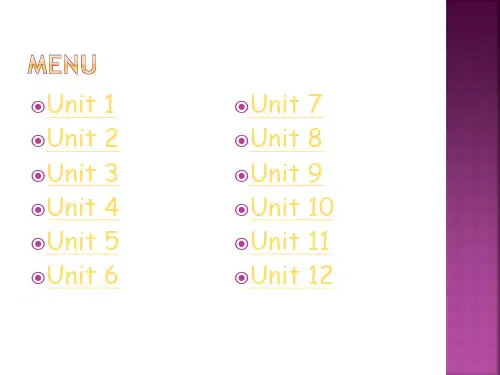
MBA program 工商管理硕士课程 course/program 课程 study abroad 留学 liberal arts 文科 brain drain 人才流失 liberal education 人文教育 transcript 成绩单 humanities 人文 4-year path 四年制 paper 论文 cram ( 考前) 死记硬背 thesis 毕业论文 faculty ( 学校里的) 教职人员
well-known in artistic circles 在艺术圈里闻名。
3. Through a period of more than half a century of combination and integration of various kinds of opera there evolved the present Beijing Opera, the biggest kind of opera in China, whose richness of repertoire, great number of artists of performance and of audiences, and profound influence are incomparable in China.
我忍受不了交通噪音。
Playing volleyball just isn’t my cup of tea.
我不喜欢打排球。
He doesn’t care too much for classical music.
他不太喜欢古典音乐。
the goal of education 教育目的 university ( 综合性) 大学 attach importance to education 重视教育 science student 理科学生 quality-oriented education 素质教育 engineering student 工科学生 exam-oriented education 应试教育 campus 大学校园 cheat in exams 考试作弊 bachelor’s degree 学士学位 creative thinking 创造性思维 master’s degree 硕士学位 study load 学习负担 doctor’s degree 博士学位 diploma 文凭 educational reform 教育改革
大学英语四级写作完整ppt课件
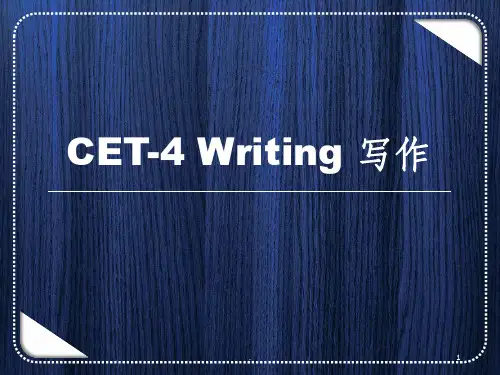
• 如果字数不少,但段落数不够,也酌情扣分。比如在要求写三段的作文
中只写了一段,只能得0—4分;只写两段,只能得0—9分。
.
4
四级写作部分简介 2.时间与字数要求
1.时间要求:30分钟 时间安排:3m 审题并构思结构和主要内容 20-25m 写 2m 检查
2. 字数要求:120-150字
.
5
考试题型
1.很多人认为有必要举行英语口语考试,理由是……
2.也有人持不同意见,……
3.我的看法和打算
.
9
如何引入?—— 一个现象
• Is a Test of Spoken English Necessary?
With the development of English education in China, nowadays, many attentions have been paid to spoken English skills. The question, wether students can actually use English as a communication tool after years of study, has caused hot debate. As a result, test of spoken English is becoming increasingly common in English education. But does it really necessary to set such a test?CET-4 WritiFra bibliotekg 写作.
1
CET-4的新变化 (Since 2013)
• 改变1(Listening Part) 原复合式听写题目中的句子听写换成听写单词与词组。 优势:学生不需要听长句,正确率上升 缺点:数量增多,需要听写共10个单词/词组。
2024年6月大学英语四级考试真题第四套
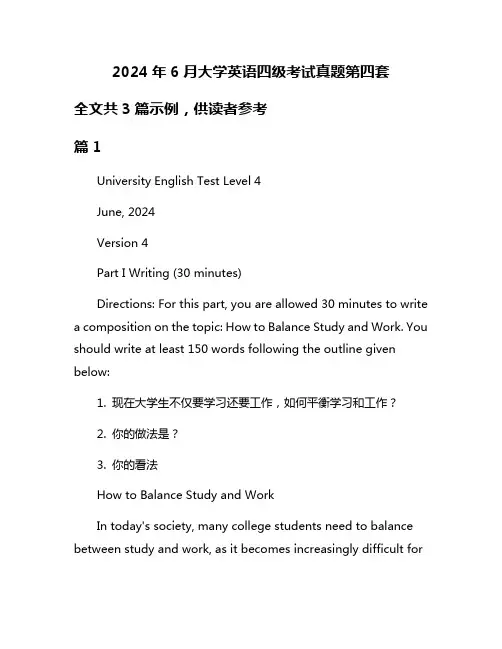
2024年6月大学英语四级考试真题第四套全文共3篇示例,供读者参考篇1University English Test Level 4June, 2024Version 4Part I Writing (30 minutes)Directions: For this part, you are allowed 30 minutes to write a composition on the topic: How to Balance Study and Work. You should write at least 150 words following the outline given below:1. 现在大学生不仅要学习还要工作,如何平衡学习和工作?2. 你的做法是?3. 你的看法How to Balance Study and WorkIn today's society, many college students need to balance between study and work, as it becomes increasingly difficult forthem to solely focus on their academic studies. However, finding this balance is crucial to their success and well-being.To balance study and work effectively, students should first prioritize their tasks and set clear goals. By dividing their time between study and work, they can better manage their responsibilities and avoid feeling overwhelmed. Additionally, students should create a schedule that allows them to allocate sufficient time for both academic studies and work commitments. This will help them stay organized and on track towards achieving their goals.In my own experience, I have found that setting priorities and creating a schedule have been instrumental in balancing study and work. By staying organized and disciplined, I have been able to successfully manage my academic workload while also excelling in my job. Moreover, I have learned the importance of self-care and taking breaks when needed to avoid burnout.Overall, balancing study and work requires careful planning and self-discipline. By prioritizing tasks, creating a schedule, and practicing self-care, students can effectively manage their responsibilities and achieve success in both areas. It is important for students to remember that finding this balance is a process that requires continuous effort and adaptability.Part II Reading Comprehension (40 minutes)Section ADirections: In this section, there is a passage with ten blanks. You are required to select one word for each blank from a list of choices given in a word bank following the passage. Read the passage through carefully before making your choices. Each choice in the bank is identified by a letter. Please mark the corresponding letter for each item on Answer Sheet 2 with a single line through the centre. You may not use any of the words in the bank more than once.Example:(0) point A.regular B. average C. common D. normalAbraham Lincoln, the 16th president of the United States, is known for many things. He led the country through the Civil War, helped to end (1) and was an advocate for the abolition of slavery. Lincoln was also known for his tall and slim stature, his top hat and, of course, his (2) beard. Lincoln's beard became one of the most iconic looks in American history and, to this day, remains a symbol of his (3) and leadership qualities.Although Lincoln is often associated with his beard, it was not something he always had. In fact, Lincoln only grew a beard after receiving a letter from an (4) who suggested he would look better with one. The 11-year-old girl, Grace Bedell, wrote to Lincoln during the presidential campaign of 1860, advising him to grow a beard to improve his appearance. In response, Lincoln began growing his beard, and by the time he was elected president, he had (5) the full beard that would become his signature look.Lincoln's beard not only changed his appearance but also (6) his image in the eyes of the American people. In an era when beards were not common among politicians, Lincoln's beard helped to set him apart and make him more memorable to voters. His beard became a (7) tool in his political career, helping to shape his identity as a strong and capable leader.In conclusion, Lincoln's beard was not just a facial feature; it was a symbol of his character and leadership. The story of how Lincoln came to grow his beard is a reminder of the power of individual choices and the impact they can have on others. Lincoln's beard serves as a lasting reminder of his (8) and his ability to connect with the American people in a unique and memorable way.word bank:A. shedB. historicalC. nationalD. hatE. appearanceF. memorableG. dealH. warI. touch J. acquiredSection BDirections: In this section, you are going to read a passage with ten questions. You should answer the questions based on the information given in the passage.For years people have been aware that arts programs are highly beneficial to children's education. Studies have shown time and time again that children who are exposed to arts programs perform better in school, have higher test scores, and are more likely to attend college.Despite this knowledge, arts programs in schools are often the first to receive cuts when budgets are tight. School administrators and policymakers often view arts programs as non-essential, focusing instead on core subjects like math and science. This mentality severely limits the opportunities availableto children and deprives them of the numerous benefits that arts education can provide.Arts programs play a crucial role in fostering creativity, critical thinking, and problem-solving skills. Through visual arts, music, dance, and theater, children are able to explore their creativity and express themselves in ways that may not be possible through traditional subjects. Additionally, arts programs help to develop important skills such as communication, teamwork, and self-confidence, which are essential for success in today's society.Furthermore, arts education has been shown to have a positive impact on students' academic performance. Studies have found that students who participate in arts programs tend to have higher grades, better attendance records, and improved social and emotional development. They are also more likely to excel in other subjects and demonstrate higher levels of creativity and critical thinking.In light of these benefits, it is clear that arts education should be considered a vital part of every child's education. By providing children with access to arts programs, we are not only enriching their lives but also preparing them for success in an increasingly complex and competitive world.Questions:9. What is the main idea of the passage?A. The benefits of arts programs in schoolsB. The impact of arts education on children's academic performanceC. The challenges facing arts programs in schoolsD. The importance of arts education in fostering creativity10. Why do school administrators and policymakers often cut arts programs?A. Because arts programs are non-essentialB. Because arts programs are too expensiveC. Because they believe core subjects are more importantD. Because they do not value arts education11. What skills can children develop through arts programs?A. Reading and writing skillsB. Discipline and obedienceC. Creativity and critical thinkingD. Physical fitness and coordination12. How do arts programs impact students' academic performance?A. They have no impact on academic performanceB. They lead to lower grades and attendance recordsC. They result in higher test scores and better gradesD. They are only beneficial for creative students13. Why is arts education important for children?A. It improves their social skillsB. It fosters creativity and critical thinkingC. It prepares them for collegeD. It is required by most schoolsPart III Listening ComprehensionSection ADirections: In this section, you will hear 8 short conversations and 2 long conversations. At the end of each conversation, one or more questions will be asked about what was said. Both the conversation and the questions will be spoken only once. After each question, there will be a pause. During the pause, you must read the four choices marked A), B), C), and D), and decide whichis the best answer. Then mark the corresponding letter on Answer Sheet 2 with a single line through the centre.1. A. Making a reservation. B. Having lunch.C. Ordering food.D. Talking about a trip.2. A. Swimming. B. Jogging.C. Playing soccer.D. Playing basketball.3. A. She is staying in. B. She is feeling unwell.C. She is going out.D. She is working late.4. A. Markers. B. Pencils.C. Pencil case.D. Highlighters.5. A. He is addicted to coffee. B. He is trying to cut down on coffee.C. He prefers tea over coffee.D. He does not drink coffee.6. A. She is afraid of heights. B. She enjoys flying.C. She is excited about her trip.D. She is nervous about flying.7. A. She is on a diet. B. She is trying to lose weight.C. She is allergic to dairy.D. She does not like ice cream.8. A. Study for a test. B. Watch a movie.C. Finish an assignment.D. Go out for dinner.Conversation 1M: Hey, Emma. I heard you were going to Spain this summer. That sounds like fun!W: Yeah, I'm really excited. I've never been there before.M: Remember to bring back some souvenirs for me!W: Sure, I'll try to find something nice for you.Q14. What does the man ask the woman to do?A. Buy him a ticket to Spain.B. Bring him back some souvenirs.C. Take him on a trip to Spain.D. Remember to visit him.Conversation 2M: Good morning. I'd like to make a reservation for two for lunch at 12:30.W: I'm sorry, sir. We are fully booked for lunch today. Would you like to make a reservation for dinner instead?Q15. What is the man trying to do?A. Order food.B. Make a reservation.C. Have lunch.D. Talk about a trip.Section BDirections: In this section, you will hear 3 short passages. At the end of each passage, you will hear some questions. Both the passage and the questions will be spoken only once. After you hear a question, you must choose the best answer from the four choices marked A), B), C), and D). Then mark the corresponding letter on Answer Sheet 2 with a single line through the centre.Passage 1Today's weather forecast: cloudy skies with a chance of showers in the afternoon. Temperatures will remain in themid-60s with a light breeze from the east. Make sure to bring an umbrella if you're heading out later today.Q16. What is the weather forecast for today?A. Cloudy skies with showers in the morning.B. Clear skies with a chance of rain.C. Cloudy skies with showers in the afternoon.D. Sunny skies with no chance of rain.Passage 2The history of the Modern Olympic Games dates back to 1896 when the first Games were held in Athens, Greece. The Olympics have since become a global event, bringing together athletes from around the world to compete in a variety of sports.Q17. When were the first Modern Olympic Games held?A. 1904 in London.B. 1886 in Paris.C. 1896 in Athens.D. 1920 in Rome.Passage 3The Great Wall of China is one of the most famous landmarks in the world. Built over several centuries, the wall stretches for thousands of miles across northern China, spanning different dynasties and architectural styles.Q18. What is the Great Wall of China known for?A. Being the longest wall in the world.B. Being built over several centuries.C. Spanning different dynasties and styles.D. All of the above.Part IV Translation (30 minutes)Directions: For this part, you are allowed 30 minutes to translate a passage from Chinese into English. You should write at least 150 words.中国政府一直致力于保护环境,采取了一系列措施来减少污染、保护自然资源和生态环境。
大学英语教程4读写译UNIT 6 ppt课件
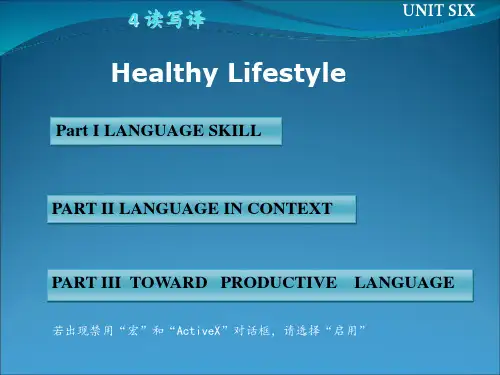
大学英语教程4 读写译
READING SELECTION: TEXT A
UNIT SIX
激励孩子取得成功
作为父母, 不知从什么时候开始,我们失去了一些东 西。失去了对孩子的未来至关重要的东西。 如今,有太多的青少年没有进取精神。在他们看来,工作 是一个由四个字母组成的令人生厌的字眼。他们不像我们 一样拥有梦想和希望。他们不尊敬长者,视父母如奴隶。 在为你的¡°约翰尼¡辩 ± 解之前,有一些孩子还真与此不同, 令人惊叹不已。 这些孩子让我们感到鼓舞,但是遗憾的是 他们的数量太少。有很大一部分没有受到很好激励的青少 年,明显存在于收入偏低、受教育少的社会经济层次中。 文化发生了转变,我们忙于给孩子一个童年,以至于没有
5. As the children get older, into their late teens this becomes even
more burdensome for parents. (troublesome)
BACK
大学英语教程4 读写译
KEY WORDS MADE EASY
UNIT FOUR
4. The first responsibility of any parent is to slowly, and without
trauma, teach their fledglings the ability and desire to function as
responsible adults. (an emotional wound)
more obvious in the lower income, or lesser educated, socio-
economic brackets. (category)
大学英语四级考试必过技巧PPT课件

15. A) He is pleased with his exciting new job.
B) He finds the huge workload unbearable. C) He finds his office much too big for him. D) He is not so excited about his new position.
从选项中重复出现的washing machine, 以及 buy, fixed, old, new等信息判断对话可能关 于洗衣机坏了,到底是修还是买一个新的洗 衣机的问题。
做题技巧:
1. 对于内容与其他三项内容相差比较远的 选项,我们可以预先排除,比如这一题 的A选项。
2. 注意意思相反的选项,比如这题的B和D。 B讲的是买一台新的洗衣机,D讲的是修 好旧的洗衣机。意思相反的选项很有可 能其中一个是正确答案。大英语四级听力讲座讲座大纲
Ⅰ. 四级听力常考题型与分值 Ⅱ. 听力策略与技巧 Ⅲ. 不同题型的应试技巧 Ⅳ. 如何养成良好的听力习惯 v.备考指南
Ⅰ. 1. 四级听力常考题型 (2006年6月开始)
测试内容
测试题型 比例
第一部 分:
听力理 解
听力对话 短对话 多项选择 8% 长对话 多项选择 7%
特别注意一些如howeverbut之类的转折词?以上举的一套真题实例说明拿到题目同学们要做的第一件事就是抓紧时间看选择项?建议同学们在试题卷上可以用笔把预览时发现的有助于我们做判断的关键词划下横线要有选择性地划而不是全划?那么还有同学想问如果四个选项中我听到了好几个怎么办那提醒大家要逆向思考会不会考的是没有提到的选项呢
6. 意义策略
不需要听懂每一个词,注重听懂大意。如:
全新版大学英语综合教程第四册课件_Unit4
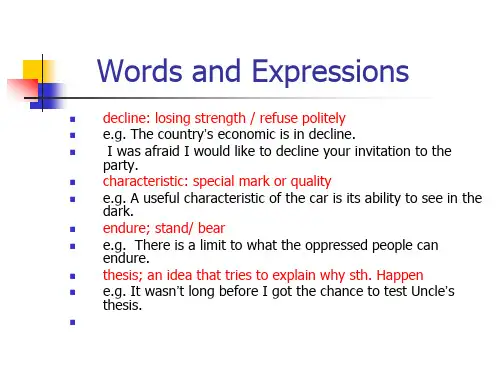
Sentence 15: Here we see a revolution that is constructive----Here we can see a constructive revolution.
Sentence16: For the destructive, paralyzed world where I have spent---(Line89): ---, tell you the truth, it is very important and meaningful that there exists Los Angeles.
aggressiveness :the quality of pushing e.g. The new government follows an aggressive foreign policy. paralyze : make ineffective e.g. The climber was paralyzed. historical: concerning past events e.g. Mr. Thompson gave all the historical papers of his grandfather to the public library according to his grandfather’s will. precedent :earlier happening e.g. He can not go for he has a precedent engagement.
sense: realize e.g. He sensed that his answer was so confusing that the teacher couldn’t understand it. for the first time: never before E.g. He entered into the quarter-finals in the world Cup for the first time leave behind: cause sth. to remain premonition : previous notice or warning e.g. The day before her accident, she had a premonition of something horrible.
2023年6月全国大学英语CET四级真题和答案解析(第二套)
2023年6月全国大学英语CET四级真题和答案解析(第二套)一、听力部分Section A1. 答案:B解析:根据对话,可以得知购物者向售货员咨询特价食品的价格。
2. 答案:C解析:女士询问男士是否去过广州,男士回答他正在那里工作。
3. 答案:A解析:对话中,男士提到他计划去参观一个建筑展览,女士则建议他去参观科技博物馆。
Section B4. 答案:A解析:女士在婚礼上生病,男士主动提出帮忙送晚礼服。
5. 答案:B解析:女士正在找工作,男士就女士关于工作的问题给出建议。
6. 答案:C解析:对话中,男士询问女士是否对比赛感到紧张,女士回答说她很兴奋。
Section C7. 答案:B解析:讲座中提到,人们使用社交媒体来建立和维护社交关系。
8. 答案:A解析:讲座中提到,过多地依赖社交媒体可能导致孤立和焦虑。
9. 答案:C解析:讲座中的例子表明,人们可能会在社交媒体上展示过度的积极情绪或幸福生活。
Section D10. 答案:D解析:广告说明了新产品的特点和价格,最后提到消费者可以在网上购买。
11. 答案:A解析:广告中提到,购买新产品的消费者可以获得额外的现金返还。
12. 答案:B解析:广告提到消费者可以在购买新产品时享受特别优惠价。
二、阅读部分Passage 113. 答案:C解析:根据文章第一段,大量研究表明,阅读对个人的心理健康有益。
14. 答案:A解析:根据文章第二段,阅读可以帮助人们减轻压力和放松大脑。
15. 答案:B解析:根据文章第四段,阅读可以帮助人们学习新的事物和扩展知识。
Passage 216. 答案:C解析:根据文章第一段,当地政府已经发起了一项计划,将现有的溪流修复为自然生态景观。
17. 答案:A解析:根据文章第二段,溪流的修复不仅可以改善水质,还能提供更多的自然资源。
18. 答案:D解析:根据文章最后一段,修复的溪流有望吸引更多的游客,促进当地经济发展。
Passage 319. 答案:B解析:根据文章第一段,数字支付正在变得越来越普遍,并在全球范围内快速增长。
大学英语四ppt课件
Exam format
Total score
The total score of the College English Test Band 4 exam is 100 points
Cut off score
The passing score for the exam is usually 60 points
anቤተ መጻሕፍቲ ባይዱ
01
Introduction to College
English
Examination background
Established in 1999
The College English Test Band 4 was established in 1999, originally known as the National English Level Test Band 4
Purpose of the exam
The exam aims to evaluate students' English proficiency and provide a standard for assessing their language skills
Importance of the exam
02
Improving listening skills: Listening skills can be improved through practice and systematic training Students can improve their listening skills by listening to English materials, such as English news, movies, and podcasts, and actively analyzing the language and cultural content
全国大学英语四级辅导讲座CET4必看PPT课件
2021/4/6
1
2021/4/6
2
你知道四级的答题顺序吗?
作文
快速阅读
听力
在答题纸1上作答, 完成后交答题纸1. 剩下题目在答卡2 上作答.
翻译
完型填空
2021/4/6
选词填空
传统阅读
3
注意 (1)
改变传统的英语考试先做听力,再做阅 读, 最后写作文的习惯。一进考场就集中注意力 写作文。等试题册发下来后,抓紧时间做快 速阅读。交了答题卡1后,准备做听力。
二.考试日期: 2009年11月28,29日(两天)。
三.报名时间: 2009年10月26日09:00时至31日16:30截止。
四.报名方式: 口语考试采用网上报名方式。考生自主选择一 个考点报名参加考试。因考点容量所限,报名额满为止。
五.报名202费1/4:/6 每名考生报名费为50元。
11
时间流程表
14
话题
Ⅰ.大学生话题 大学生话题:主要涉及大学生的校园学习、生活、择业及人生观等方面 A.学习: On Students’ Selecting Lecturers (2006, 6 New) Is A Test of Spoken English Necessary? (2000, 6) How I Finance My College Education? (2000, 1) Reading Selectively or Extensively? (1999, 6) How I Overcame My Difficulties in Learning English? (1992, 6) B.生活: Volunteers Needed (2006, 6 Old) Teachers’ Day (2005, 6) A Campaign Speech(2005, 1) The Day My Classmate Fell Ill/Got Injured(2003,9) A Letter to the University President about the Canteen Service on Campus.(2002,
全新版大学英语 综合英语4 Unit 6 课件
Text Organization
Blank Filling Facts are valuable as evidence that enhances the persuasive force of an argumentative paper. In stating the first reason, the author lists a number of facts to try to convince the readers of the unfavorable effects technology has had on our lives. Now could you find some more supporting facts apart from the one given below, and put them down?
2. What is remedy for the stress according to the author’s opinion?
A possible remedy is that we should understand the problem and realize that it is not more time we need, it is fewer desires.
Text Organization
Blank Filling 1. The motorcar brings more traffic problems than it promises to solve. 2. The aircraft creates a high demand for time-consuming ___________________________________________________________________ ___________________________ journeys that we never dreamed of. 3. The washing machine, contrary to our expectations, multiplies _______________________________________________________________ _______________________________ the hours spent on washing and ironing. 4. Instead of making our lives easier, technology goes so far as _________________________________________________________ _____________________________________ to cram extra work into our leisure time. 5. Technology produces the new burden of dealing with faxes, ________________________________________________________ ______________________________________ e-mails and voicemails. 6. Technology eats further into our time by forcing us to ___________________________________________________ handle software glitches on computers and filling our ___________________________________________________ ___________________________ heads with useless information from the Internet.
- 1、下载文档前请自行甄别文档内容的完整性,平台不提供额外的编辑、内容补充、找答案等附加服务。
- 2、"仅部分预览"的文档,不可在线预览部分如存在完整性等问题,可反馈申请退款(可完整预览的文档不适用该条件!)。
- 3、如文档侵犯您的权益,请联系客服反馈,我们会尽快为您处理(人工客服工作时间:9:00-18:30)。
2005年6月全国大学英语四、六级及应用能力考试总体安排
一、时间:2005年6月7、8、18、19日共4天
7、8日下午4:40—6:40 大学英语应用能力机试
18日上午:9:00—11:20 大学英语四级考试
18日下午:3:00— 5:20 大学英语六级考试
19日上午;9:00—11:10 大学英语应用能力考试笔试
二、总主考(总指挥):杨海涛汤耀平副总主考(副总指挥):张友凯宋启林
主考:关兴华总监考:肖光宏杨小元
总巡考:陈志荣肖欢迎总考务:梁京丽陈建辉
三、考务:另行安排
试卷:梁京丽谭日森
考务室:模拟银行指挥中心:模拟银行办公室
四:监考安排(见附件)
五、需要其它部门配合的工作:
(一)外语系:
1、负责派15名考务人员,其中安排两名老师负责播放录音;
2、负责安排参加PET计算机考试的学生(校本部和肇庆校区均安排两批次,100人/批)。
(二)设备处:
1、负责播音调试工作,检查各试室听音情况;
2、为监考老师准备180副听音耳机;
3、考试期间关闭计算机房;
4、负责调试PET计算机考试实验室,5月30日—6月2日模拟练习,6月7、8日考试。
(三)会计系:负责提供模拟银行作为考务室。
(四)学生处:
1、安排50名学生协助教务处考场布置;
2、通知各系总支,告诉学生务必在考试前找到自己的试室,并提醒学生6月17日晚自修时注
意保护各试室的考试桌标。
(五)保卫处:
1、协助领取和保管试卷;
2、负责维持考场秩序和考试结束后的清场工作,每栋楼派1名保安人员负责保安工作;
3、加强考试场地及周边安全保卫工作,禁止摩托车、出租车以及与考试无关的人员进入校园,
确保考场周围道路畅通无阻。
(六)宣传部:负责订做悬挂宣传横幅。
(七)后勤管理处:
1、通知各建筑工地6月18日全天、19日上午停工;
2、安排医务人员值班。
(八)后勤服务中心:
1、安排电工房人员值班,保障电力供应;
2、调整电铃:(考试结束后请调回正常上课时间)
上午:8:45预备 9:00开考 11:20结束(6月19日 11:10分结束)
下午:2:45预备 3:00开考 5:20结束
3、6月18日正常开放教工饭堂;
4、车辆安排:
6月18、19日接送监考老师(具体时间、路线见通知);
6月16日下午3:30及18日早上5:00从学校出去省考试中心领卷;
6月18日下午18:30及19日下午15:00派车从学校出发送试卷去省考试中心。
5、安排人员在6月17日下午打扫所有试室。
教务处
二00五年五月二十五日
全国大学英语四、六级及PET考试
监考须知
全校各系、部、处、室:
全国大学英语四、六级考试定于2005年6月18日(星期六)上午9:00和下午3:00在我校举行,应用能力考试定于6月19日(星期天)上午9:00举行,四级考试共设129个考场,六级和应用能力考试共设102个考场,需要全校大部分教职工回校参加监考,为做好此次考试工作,现将有关事项通知如下:
一、监考老师监考时必须严格遵循以下规则:
1、请各监考老师务必于上午8:10,下午2:30到考务室签到、领取试卷。
考务人员于上午7:45,下午2:00到考务室报到。
考务室:模拟银行
2、严禁私自调整监考场地,私自调整者不计报酬。
3、各试室排在第一位的监考教师为主监考教师。
并提前报教务处批准。
无故缺监考,按教学事故处理。
三、交通安排:
6月18、19日早晨:按上班时间和路线开车。
中午:12:30按原线返回。
下午:5:30学校——岗顶——龙口——骏景
教务处
2005年6月10日
附:监考名单安排表
会议通知
全校各系、部、处、室:
16周星期四(6月16日)下午2:10分在大礼堂召开全体监考人员会议,杨副院长做大学英语四、六级暨期末考试监考动员报告,务请系部主任、总支书记及全体监考人员准时报到签名、参加会议,严禁代签。
因特殊情况不能参加会议者,应事先向系主任请假并报教务处备案。
无故不
参加会议者,将在网上予以公布,并报学校作其他处理。
教务处
2005年6月10日
各系、部监考名单
总主考(总指挥):杨海涛汤耀平
副总主考(副总指挥):张友凯宋启林
主考:关兴华
总监考:肖光宏杨小元
总巡考:陈志荣肖欢迎
总考务:梁京丽陈建辉
考务:梁京丽杨海青谭日森杨莉邓蔼雯汪斌斌王颖余薇曹萍杨莹莹樊雪夏娟潘燕萍王芳吴之凯
周虹温穗君毕亚男钟国莺陈建辉吴文忠黄国雄
潘磊陈开彬郑荣年许丽莹李超赵彦霞
金融系:张自力、贺伯锋、刘飞荣、范宜波、李石凯、贾宏、张文云、(34人)王晓雷、郑桂平、贺晖、张莉、刘昊虹、林力、李义、王颖、马飞、罗娟、吴辉帆、胡小波、欧阳敏、饶华春、
梅光仪、刘在军、李湛、罗瑞琼、张纯威、张栋贤、秦印、
王佳燕、鲁细根、杨年松、石巧荣、黄剑、李红
经贸系:宋艳坤、朱蓓、何承栋、沈少容、黄雄杰、彭云、张卫、(30人)李健欣、方树萌、聂莉、刘运顶、傅耀、李春芳、骆田茵、武奕波、潘忠、刘志荣、张捷、吴立平、杨林、胡北平、
陈利娟、刘艳、陈超、刘玲、汪前元、林晓慧、叶湘榕、
莫莉、陈凤者
保险系:粟榆、黄晓莉、曾晓佳、方有恒、袁建华、蔡先晖、葛仁良、(15人)罗向明、王萍、秦蓉蓉、黄友爱、岑敏华、郑勋、郑州、江正发
计科系:张寿千、刘丰、曾英杰、陈华其、刘秋莲、刘薇、陈梅容、(31人)李捷、邹林达、肖庆追、朱金伟、龙赤、潘章明、唐川、李星源、朱小焱、李美红、王韵、李立、袁雪松、陈力、
王汉强、吴炎太、肖国荣、王泽、梁玉强、黄福员、李福清、
李支、罗伟、余科
会计系:万红青、韩俊梅、李萍、易茜、万静芳、郭莉、文芳、(31人)罗韵轩、汤四新、林丽华、郑俊敏、幸倞、唐小梅、黄文锋、肖望、王媚莎、李玲玉、古燕明、郭琛、石庭安、黄燕宇、
任世驰、江金锁、卢燕、梁颖红、岳龙、蔡竞云、吴喜涛、
黄锡榜、李秀颜、黄奕
外语系:杜晓进、田红雨、杜艳平、陈明凤、李毅、唐小丹、陈华娟、(28人)林菁、钟科、单丽枫、王春艳、陈潇潇、葛诗利、曾勉、黄洁萍、朱绯绯、王从遥、吴江雯、罗凡、李鹏、王建强、
高莹雪、王董心、甘容辉、刘沛富、王永霞、黄希楠、蒋颖法律系:李竖锐、黄善文、许绍玉、黄飞凤、陈薇薇、张长龙、李仲平、(13人)陈叶茂、付志刚、王杏飞、肖婉娴、李喜梅、张柏良
工管系:李小兰、李尘、田小丹、赵勍陞、王小燕、曹艳爱、刘艳、(13人)章冠球、蔡涛、宋健、石飞、梁云、尚晓玲、吴茵、刘梅生
社科部:黄薇、李少屏、张间生、刘芬华、肖乐群、禹芳琴、吴晓莉、(18人)张俊君、杨济源、张秀华、高淑贤、袁馨泉、杨文定、王胜利、陶冶、孙雨嘉、陈世柏、余暖娜
基础部:廖钰珊、常淑芬、冯镜祥、高潮、张华强、尹祖辉、邱妙云、(20人)林彦芸、张泳华、赵梅春、梁谭健、林伟刚、梁川、李广析、郭琴、洪俊雄、屈江波、黄振豪、刘苹、张学奇
行政:刘岩、任淑纯、孙海慧、张爱莉、马素玲、朱培松、何晓华、(23人)张碧红、王中志、黎芳玉、颜佩仪、赖志成、蔡秋华、许丽华、孔祥燊、杜今锋、王在新、郭丽、陈暖、张春兰、林明霞、
黄秀兰、杨健敏
文档来源为:从网络收集整理.word版本可编辑.欢迎下载支持.。
